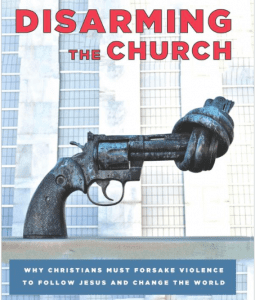 Before touring Turkey, Greece, and Pompeii-Rome with our Northern Seminary MA in New Testament students, I posted on this new book and I want to resume — by way of refreshing and addition — that series today.
Before touring Turkey, Greece, and Pompeii-Rome with our Northern Seminary MA in New Testament students, I posted on this new book and I want to resume — by way of refreshing and addition — that series today.
Eric Seibert, in his new book, Disarming the Church, takes up the same big topic — violence and the church and the Christian and Jesus — and offers a pastoral theology of non violence with responses to claims for violence in the church. This is an important new study and worthy of serious reflection and discussion. The problem is that many don’t think this is even a problem.
Is this even a question in your church? If so, which demographic is asking this question? Is this topic do-able in your church?
So why write such a book? Here are his biggest ideas:
I wrote Disarming the Church because I am troubled by how much violence Christians condone—and sometimes participate in—and by how much violence the church sanctions and sometimes actively supports. I do not believe this is what God intended. God does not want people to be victims of violence—and certainly not at the hands of those who claim to be following God! In fact, one of the central claims I will make, and one I believe is borne out by a careful reading of the Gospels, is that Jesus lived nonviolently and taught his followers to do the same. Condoning or participating in violence, even for the most noble reasons, runs contrary to the teachings of Jesus. Therefore, I have written to encourage Christians to reject all forms of violence as they strive to follow Jesus.
A big issue in intellectual studies about violence is defining violence:
Violence is physical, emotional, or psychological harm done to a person by an individual(s), institution, or structure that results in serious injury, oppression, or death.
And the same applies to non-violence: What is it? He offers a thoroughly Christian definition of non-violence.
To that end, I define Christian nonviolence as a way of life modeled after Jesus, one that completely rejects violence, actively confronts evil, and unconditionally loves others by practicing gracious hospitality, radical forgiveness, and deep compassion. Put simply, nonviolence is love in action.
Seibert then explores a number of major themes before he gets to Jesus, including glimpses of non violence in the Old Testament. In other words, some resources are found in the Old Testament that (seem to) counter the rather graphic violence sometimes displayed.
A number of Old Testament narratives describe people dealing with conflict without resorting to violence. Examples include the story of Joseph, the man who forgave his brothers (Gen 45:1-15; 50:15-21); the story of Abigail, the woman who prevented a massacre (1 Sam 25:2-43); and the story of Elisha, the prophet who fed his enemies (2 Kgs 6:8-23), among others. These narratives, which demonstrate the resolution of conflict without bloodshed, encourage us to seek alternatives to violence as well.
The Old Testament also contains a number of specific verses that condemn, or at least seriously constrain, violence and killing. The sixth commandment prohibits killing (Exod 20:13); the Psalmist declares that God’s ‘soul hates the lover of violence” (Ps 11:5), and the writer of Proverbs 3 says not to “envy the violent” or “choose any of their ways” (Prov 3:31), to cite just a few examples.
In addition, the prophets instruct people to avoid violence and to live peaceably with others. The prophet Jeremiah said, “Act with justice and righteousness And do no wrong or violence to the alien, the orphan, and the widow, or shed innocent blood in this place” (Jer 22:3), and Ezekiel told Israel’s leaders to “put away violence and oppression, and do what is just and right” (Ezek 45:9). More strikingly, the prophets dared to dream of a world without war. Isaiah envisioned a day when weapons would be transformed into agricultural tools and military academies would close their doors forever. On that day, people “shall beat their swords into plowshares, and their spears into pruning hooks; nation shall not lift up sword against nation, neither shall they learn war any more” (Isa 2:4; cf. Mic 4:3). Similarly, the prophet Hosea spoke of a time when God “will abolish the bow, the sword, and war from the land” (Hos 2:18).
In my estimation, a Christian eschatology can begin right here: if the prophets announced a day without violence, and if the kingdom has been ushered in by Jesus, then what the prophets announced ought to have more than a little bearing on how Christians act today. If the kingdom is ushered in, then violence and the end of war is ushered in.
Now we turn to Jesus and you can look up these verses:
First, in the Sermon on the Mount we are called to be peacemakers (Matt 5:9) and to love our enemies (5:38-48) and to love the Golden Rule (7:12).
Second, two moments where Jesus taught nonviolence: when they asked about fire from heaven (Luke 9:51-56) and in the Garden of Gethsemane (22:47-53): No, No to violence.
Third, stare at these verses from John 18:
Then Pilate entered the headquarters again, summoned Jesus, and asked him, “Are you the King of the Jews?” Jesus answered, “Do you ask this on your own, or did others tell you about me?” Pilate replied, “I am not a Jew, am I? Your own nation and the chief priests have handed you over to me. What have you done?” Jesus answered, “My kingdom is not from this world. If my kingdom were from this world, my followers would be fighting to keep me from being handed over to the Jews. But as it is, my kingdom is not from here.”
The early church followed Jesus. Violence, killing, war … not for the Christians, but that’s another chapter.
















